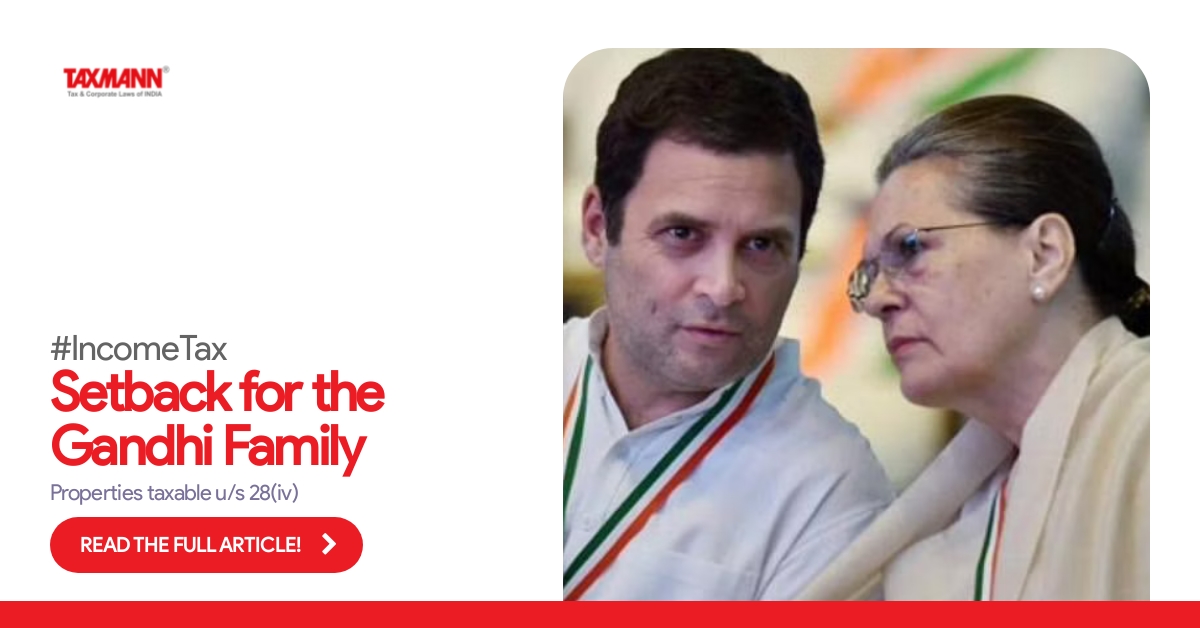Setback for the Gandhi Family – Properties taxable u/s 28(iv)
- Blog|News|Income Tax|
- 3 Min Read
- By Taxmann
- |
- Last Updated on 4 April, 2022

Case Details: Young Indian v. ACIT (E) - [2022] 137 taxmann.com 12 (Delhi - Trib.)
Judiciary and Counsel Details
-
- Anil Chaturvedi, Accountant Member and Amit Shukla, Judicial Member
-
Saurabh Soparkar, Sr. Adv. Ankit Agarwal and Ms. Anjali Agarwal, CA’s for the Appellant.G.C. Srivastava, Special Counsel, Kalrav Malhotra, Adv. and Mayank Patawari, CA for the Respondent.
Facts of the Case
Assessee-Young Indian (YI) was incorporated with the main object of inculcating in the mind of India’s youth. Its registration under section 12A was cancelled with inception by the CIT(E) as it was not carrying out any charitable activity. Smt. Sonia Gandhi, Sh. Rahul Gandhi, Sh. Moti Lal Vora – treasurer of the All India Congress Committee (AICC), and Mr. Oscar Fernandes were Directors of Young Indian.
Associated Journals Limited (AJL) was a public limited company publishing newspapers such as National Herald in English, Navjivan in Hindi and Quami Awaz in Urdu. Later its publication business was suspended due to financial and labour problems. Thereafter income of AJL was mainly from letting out various properties held in different parts of the country.
AICC had advanced loan to AJL from time to time, aggregating to Rs. 90.21 crores. The entire loan was transferred in favour of Young Indian for a consideration of Rs. 50 lakh. The loan assigned to YI was later converted into shares of AJL, and almost 99.99% of shareholdings were transferred to YI.
Based on the information received from the investigation wing, the Assessing Officer (AO) reopened the assessment of Young Indian under section 147. AO computed the benefit/perquisite under section 28(iv) in respect of the purported Fair Market Value (FMV) of the immovable properties owned by AJL in the hands of Young Indian.
ITAT Held
The Delhi Tribunal held that Young Indian was incorporated on 23.11.2010, and the first step taken was the assignment of the loan of Rs. 90.21 crores by AICC to Young Indian for a very paltry sum of Rs. 50 lakh.
Immediately after that, the entire shareholding of AJL is allotted, i.e., 90.21, crore equity shares in lieu of assignment of the loan of Rs. 90.21 crores.
The AJL, whose publication business was suspended, had income from commercial exploitation of the properties. Once Young Indian took over the entire company, all the underlying assets had also been acquired. A clear-cut benefit had come to Young Indian in the form of assets owned by the AJL. The intention of the assessee was never to take over the entire AJL to run the publication business.
Section 28(iv) says that there should be benefit or perquisite, whether convertible into money or not, arising from business or exercise of a profession. The term business has been defined under section 2(13), which includes any adventure or concern in the nature of trade or commerce.
The adventure in the nature of trade is something where a person undertakes an adventure that may result in gain or profit immediately or may be in the future. The Young Indian was holding more than 99% shares of AJL and, after this adventure, got complete control over these properties.
Further, the word ‘benefit’ occurring in section 28(iv) means some kind of adventure or gain or had the same value or acquire any interest in any land, chattel, etc. Thus, this benefit is nothing but any form of adventure, and in the instant case, the adventure is getting the huge underlying properties by the stroke of one transaction.
Thus, the Assessing Officer rightly taxed the FMV of properties acquired as business income in the hands of Young India under section 28(iv).
Disclaimer: The content/information published on the website is only for general information of the user and shall not be construed as legal advice. While the Taxmann has exercised reasonable efforts to ensure the veracity of information/content published, Taxmann shall be under no liability in any manner whatsoever for incorrect information, if any.

Taxmann Publications has a dedicated in-house Research & Editorial Team. This team consists of a team of Chartered Accountants, Company Secretaries, and Lawyers. This team works under the guidance and supervision of editor-in-chief Mr Rakesh Bhargava.
The Research and Editorial Team is responsible for developing reliable and accurate content for the readers. The team follows the six-sigma approach to achieve the benchmark of zero error in its publications and research platforms. The team ensures that the following publication guidelines are thoroughly followed while developing the content:
- The statutory material is obtained only from the authorized and reliable sources
- All the latest developments in the judicial and legislative fields are covered
- Prepare the analytical write-ups on current, controversial, and important issues to help the readers to understand the concept and its implications
- Every content published by Taxmann is complete, accurate and lucid
- All evidence-based statements are supported with proper reference to Section, Circular No., Notification No. or citations
- The golden rules of grammar, style and consistency are thoroughly followed
- Font and size that’s easy to read and remain consistent across all imprint and digital publications are applied



 CA | CS | CMA
CA | CS | CMA
